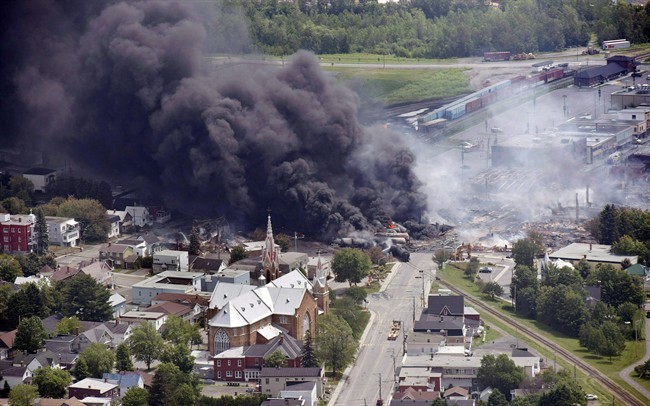Montreal, Maine and Atlantic Railway, the company that owned the train that derailed and killed 47 people, did not strive for safety, the lawyer representing the train engineer suggested in his closing arguments Tuesday.

READ MORE: Are the right people on trial for Lac-Mégantic train disaster?
MMA did not require its employees to regularly perform brake system tests that were perfectly in line with the rules, he said.
Therefore, the 14 jurors can’t hold his client, Tom Harding, criminally responsible for not conducting a perfect brake test the fateful night before the train began moving on its own, Shearson said.
Rail employees Harding, Richard Labrie and Jean Demaitre have all pleaded not guilty to one count of criminal negligence causing the death of 47 people.
Harding and his legal team have admitted the engineer didn’t apply enough brakes to the 73-wagon train on July 5, 2013, before he left for the night.
READ MORE: Harding’s conduct not perfect, but reasonable
Shearson said witness testimony during the trial demonstrated that other MMA employees showed a “pattern of non-perfect compliance” with the rules on brake tests.
“We can’t hold people criminally responsible for not being perfect,” he said.
Shearson argued Harding acted reasonably by applying what he thought was a sufficient number of brakes.
WATCH BELOW: Trial underway
Hours after he left, however, a fire broke out on the locomotive, and firefighters turned off its engine after extinguishing the flames, compromising the braking system.
Early on July 6, 2013, the unmanned train barrelled into Lac-Mégantic, derailed, exploded and killed 47.
READ MORE: Closing arguments continue in Lac-Mégantic train disaster trial
Shearson added that Harding was alone the night he parked the 73-wagon train loaded with crude oil.
One-man crews on trains carrying dangerous goods were banned in Canada following the Lac-Mégantic derailment.
“One-man crews are no longer allowed,” Shearson said, referring to the rule imposed by the federal government shortly after the rail disaster.
“If it doesn’t make a difference then why take it away?”
Harding’s legal team is expected to conclude its closing arguments Tuesday afternoon.
READ MORE: Train conductor played significant role in Lac-Mégantic tragedy: Crown
Quebec Superior Court Justice Gaetan Dumas is to give his instructions to the jury Wednesday.
The Crown delivered closing arguments last week, as did lawyers representing Labrie and Demaitre.










Comments